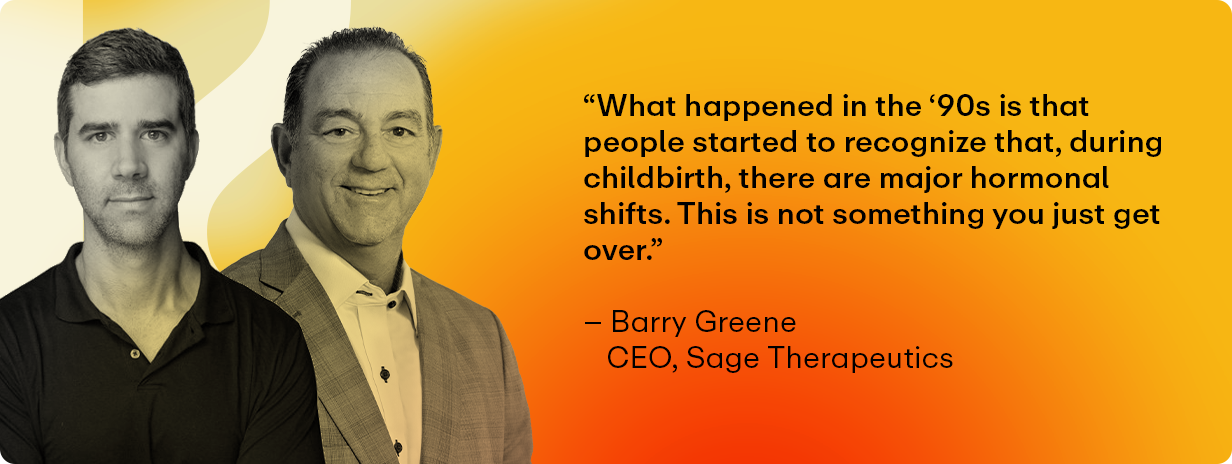When Sage Therapeutics launched Zurzuvae in late 2023, it became the first oral treatment for postpartum depression. If that surprises you, it shouldn’t: Postpartum depression itself wasn’t recognized as a medical condition in the United States until 1994.
While Zurzuvae has proven a game-changer in the space, Sage CEO Barry Greene believes that, collectively, we still have a long way to go in addressing challenges around maternal mental health. In this excerpt from his podcast interview with Kinara co-editor Chase Feiger, Greene – whose long career in life sciences includes leadership roles at AstraMerck, Millennium Pharmaceuticals and Alnylam Pharmaceuticals – outlines a path forward.
(This Q&A has been edited for length and clarity. To listen to the full Kinara podcast with Barry Greene, click here.)
Chase Feiger: It’s incredible to think that, although the condition has existed for centuries – Hippocrates wrote that some women experienced illness after giving birth – postpartum depression did not become a formally defined medical concept in the United States until 1994. So let’s start there: What do you think about that? It’s shocking to me.
Barry Greene: Well, look, it’s the practice of medicine. We’re learning every day and changing norms based upon what we learn. What’s exciting about this time in the history of postpartum depression, with an approach like Zurzuvae, there’s a new tool in the toolkit of healthcare professionals, particularly OB/GYNs, that never existed before. There’s been a paradigm shift.
Feiger: Before we get into the depths of the PPD conversation, I want to start off with your background.
Greene: It certainly wasn’t a planned path forward. I’m an engineer by background. I was always interested in medicine and healthcare and at one point I thought about doing the MD/MPH track for hospital administration. My wife was in law school and we decided I should go work for a couple years, so I went to Arthur Andersen Consulting later. Because of my engineering background, I fell in with the group that was studying agricultural chemicals, food and drugs. As the practice grew, I wanted more and more to work on the pharma side of the world. And very fortunately, in the early ‘90s, I had a chance to work on a spinout of Merck called Astra/Merck, where we had a chance to build a company from scratch. An exciting way to learn about pharma is to build everything from scratch.
There was a CEO changeover and the new CEO, Matt Emmens, asked me to lead commercial. So at a pretty young age. I was leading a fairly significant commercial operation. We grew Prilosec to over $4 billion and really transformed gastroesophageal reflux disease. It wasn’t very well known and everyone said, “Stop drinking alcohol or eating spicy foods.” In fact, it was a disease with pathophysiology that could be improved with a drug. The healthcare professionals said, “There’s not an unmet need here,” but that’s not what their patients were telling them. It was a really good lesson early in my career to learn: You need to talk to healthcare professionals, but of course you need to listen to patients.
We morphed into Astra Pharmaceuticals and then after the merger I was asked to be in London. I was actually employee number nine at AstraZeneca and led the post-merger integration. One of the interesting things that was going on at the time was that biotech was starting to make a move. A white paper by a well-esteemed consultant group said that Cambridge, Massachusetts, was gonna be the biotech hub of the world, so I had a significant conversation with my wife about what was next. She was a general counsel of a firm and it wasn’t easy for us to move, but we hitched up the wagons and moved to the Boston area. We’ve been there ever since.
Feiger: I always like to say the downs make the ups feel that much better. How were you able to continue to motivate teams during down periods?
Greene: In the biopharmaceutical world, there’s no straight line to success. The great companies are the ones that not only take advantage of their successes, but manage well through those down cycles. We certainly had ups and downs at Millennium and at Alnylam.
I always ask a couple of questions. Is the science good? And what’s the patient impact? That’s what keeps us going. Particularly at Sage, we hear stories from these moms almost every day. As you can imagine, there are stories that bring tears to your eyes. It’s important as a leader to do what’s right for patients but also to make sure you’re also doing what’s right for your team. When our teams are at our best, we can do our best – for our stakeholders, for our patients, for our doctors. And when teams get disgruntled or worn down, they’re not going to show up the right way.
Feiger: What makes Zurzuvae unique and how do you see it fitting into the current landscape of mental-health treatment?
Greene: We all know that when a mom has a baby, she often experiences a baby-blues period, a period where she’s down and exhausted. And for the longest time, others would say, “Look, just get over it. Toughen up. This is the greatest experience of your life.” What happened in the ‘90s is that people started to recognize that, during childbirth, there are major hormonal shifts. This is not something you just “get over.” So when you and other journalists tell the world that postpartum depression is a serious medical condition and not a moral failing, you can’t imagine how much that helps. There’s stigma associated with, “What do you mean, you’re not supermom? What do you mean, you don’t want to connect with your babies?”
With Zurzuvae, what we’re seeing is a profound shift in practice patterns. Instead of suspecting depression or referring, OB/GYNs are screening, diagnosing and treating. They’re bringing moms back to talk to PAs or NPs about their mental health.
Feiger: How important is it for these providers to be equipped to handle psychiatric conditions, especially as frontline caregivers?
Greene: I can tell you that psychiatrists are very excited that postpartum depression is handled by OB/GYNs. Just like with any disease, you want to attack it pharmacologically as early as possible. If you can catch a disease early, that’s better than waiting. So let’s think about the patient journey. A woman consults with her OB/GYN all throughout her pregnancy, and obviously they’re there at delivery and after pregnancy. So if a mom experiences depression in her third trimester or shortly after giving birth, the OB/GYN in their office is the frontline for seeing that.
The amount of media attention that we’ve gotten has really helped the community understand that. Again, this is a serious medical condition that needs treatment, not a moral failing. So that kind of sea change, which we’re in the midst of, has been profoundly exciting and very helpful for those women who experience postpartum depression.
Feiger: Do you think there’s a gap in medical training when it comes to OB/GYNs identifying and treating mental health issues? If so, how can Sage and the broader healthcare industry help close the gap?
Greene: You know, being a trained physician yourself, that there are always gaps in medical training. What you learned when you graduated in the ‘80s is very different from what you’re learning now. Science and medicine are moving at such a profound pace. That’s why it’s so important for Sage and others in industry to be major educators to healthcare professionals. For example, very early after launch, one of the larger OB/GYN practices in Los Angeles was very public that, because of Zurzuvae, they’re now asking moms to come back at two weeks and screening them with a PA. If that mom is diagnosed with postpartum depression, they prescribe Zurzuvae. If more practices hear that, it’s good for them because it means better patient care.
We’ve got a lot to do. One in eight live births is a postpartum depression event, so if we have a practice group that delivered 800 babies last quarter and found 30 PPD moms, in theory they may be missing 70 moms.
Feiger: How does Sage partner with HCPs to ensure that treatments like Zurzuvae are understood and utilized effectively in real-world settings?
Greene: Publications, congresses and face-to-face meetings. We use everything in our armamentarium, including social media. About 20 percent of moms tell us that they get a lot of their education on TikTok. Others get it on X. So we’ve gotta be on those platforms with true information.
Importantly, we’re seeing OB/GYNs beginning to integrate maternal mental health with obstetric care and initiating treatment for PPD, but we’re at the very beginning of this educational process. A close friend of mine visited her OB/GYN in the Massachusetts area and subtly asked about Zurzuvae. The person she saw wasn’t delivering babies and said, “Oh yeah, I know about this brand medication, but it’s expensive and insurance won’t pay for it.” That’s 100 percent wrong in Massachusetts. We have to work against that preconceived notion that any time a company launches a new drug, it’s expensive, it can’t be written, it’s high out-of-pocket.
Feiger: Have you thought about leveraging technologies like artificial intelligence to support some of these efforts – to address not only commercialization efforts, but even some of the medical education gaps?
Greene: I think that AI/machine learning type algorithms and approaches are probably overappreciated today, but far underappreciated in the long term. We’ve gotta be on top of AI so when these big shifts come, we’re not behind the curve. We’re using it across R&D and commercialization, obviously. AI is important to understanding patient patterns and patient journeys. It has also been important in the field, in terms of helping our medical professionals and our sales force understand the next best move or the next best place to go.
Feiger: What’s next for Sage? How do you see the company continuing to transform mental health care?
Greene: We want to continue to be leaders in brain health. The unmet need is profound and there are hard challenges. We need real breakthroughs that don’t just slow disease progression, but really help patients where they are. We’ve got to continue to reach as many moms as we can, and the numbers are staggering: About half a million moms a year experience postpartum depression, and less than half of those are diagnosed and less than half of those are treated.We have an obligation to keep going and going and going. I encourage all of my peers to do what George Merck told us to do a long time ago, which is focus on doing what’s right for patients and the profits will follow. I certainly try to run Sage that way.




